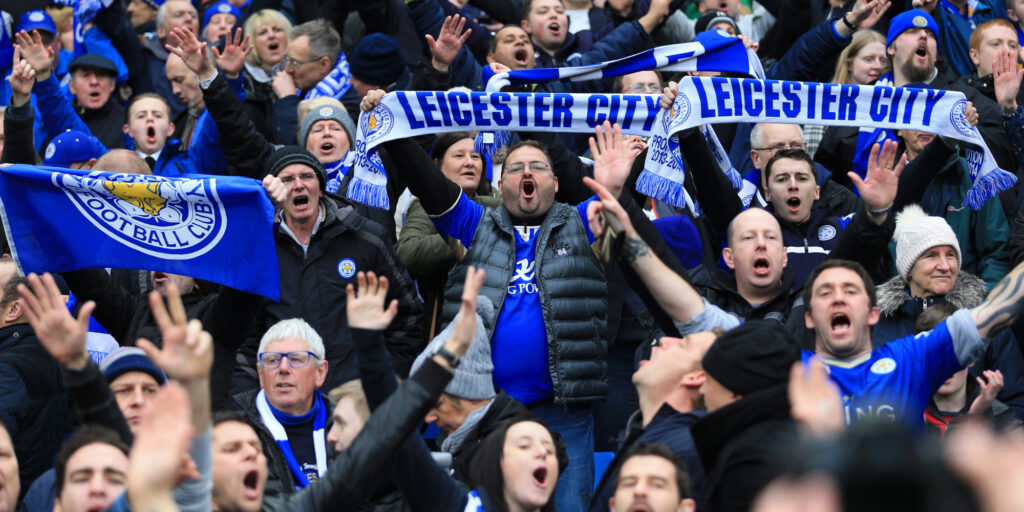
MANCHESTER, ENGLAND - FEBRUARY 06: Leicester fans celebrate during the Barclays Premier League match between Manchester City and Leicester City at the Etihad Stadium on February 6, 2016 in Manchester, England. (Photo by Simon Stacpoole/Mark Leech Sports Photography/Getty Images)
“Hundreds” is a vague figure, but if fewer than 1,000 fans had joined the protest, most Leicester supporters would have overlooked it—especially when compared to the 31,968 spectators inside King Power Stadium for the Arsenal match. The loud noise and widespread attention made it seem as though there was overwhelming backing from every Leicester fan, but that’s far from the truth.
In reality, the protest was aimed at the club’s ownership and director of football, coming off as childish and lacking the decisive action needed. Support on matchdays should be positive; if you don’t support the current team, owner, or management, it’s best to stay away. We’re all aware of the situation—nine losses in the last ten games naturally spark discontent—but only strong, positive support will help improve results in the short term.
The very definition of “supporter” is someone who is actively interested in and wishes success for a particular team. When times are tough, you shouldn’t hide behind a costume; you should at least show your face.
As always, Jon Rudkin was in the stands, doing his job. The owner, Khun Top, wasn’t present—not because he’s indifferent, but because he doesn’t attend every match. If he has other plans, such as spending time with family or fulfilling prior arrangements, why should he be expected to be at every game?
If you’re a dedicated supporter of this club, and you’re not genuinely interested in helping the team succeed on matchdays, then please stay away. Against Arsenal, a draw was within reach, but facing an opponent with a completely different budget—one that can easily deploy vast resources thanks to their overall revenue and broader financial regulations like PSR and FFP—was always going to be a tall order.
We all know this club is in good hands, yet, as Khun Top pointed out in his statement, PSR remains a critical issue to monitor. The club must avoid stretching its financial situation even further by making signings that could trigger similar problems down the line.
We believe in Leicester as a club, and history has shown that a club with such a large fanbase will inevitably experience ups and downs across the divisions. It’s challenging for a club like Leicester to maintain stability in the Premier League, as has been evident over the years. While clubs like Forest, Aston Villa, and Bournemouth are excelling this season—and Brighton and Fulham are also enjoying success—teams such as Leicester, Ipswich, and Southampton are struggling, with even Wolves and Everton falling short of expectations.
Moreover, other clubs with a rich history in the top flight—such as Leeds, Sheffield Wednesday, Sheffield United, Derby, and Coventry—are currently not performing at their best, while clubs like Norwich, Blackburn, Stoke, and Queens Park Rangers have all seen better days.
Since its inception, Leicester has had to climb back up from tier two, and even tier three, to compete at the highest level. Given the club’s size and overall fanbase, it will always face challenges in retaining its top players. Sometimes poor rotation, transfers, or missteps in youth recruitment exacerbate the issue. In the past, local heroes like Emile Heskey and Gary Lineker left the club to grow and develop—an understandable move—but the real problem lies in finding a worthy replacement. With such talent sold, the club has struggled, as evidenced by relegation threats one or two years later.
At times, the club has managed to bring in capable replacements, but as seen with Mark Bright and Ade Akinbiyi, these signings never quite filled the void, leading to a decline. The situation could have been even more dire if no new players had been brought in at all. This is an incredibly complex issue to solve. We must also remember all that Jon Rudkin has done for this club—his commitment, the fantastic signings he’s secured, and his long-standing contribution to the club’s structure. Unfortunately, the club is currently in a slump, and if a change becomes necessary, it might occur without any protest.
Ultimately, every fan is free to act as they wish, but it appears that only a very small minority are interested in this type of protest. As we saw today, the voice of that protester should not be taken as representative of Leicester supporters as a whole. This club has many positive attributes and offers significant benefits to its community. Hopefully, results will soon improve—whether by moving down a division or by returning to the Premier League in a new season.”







